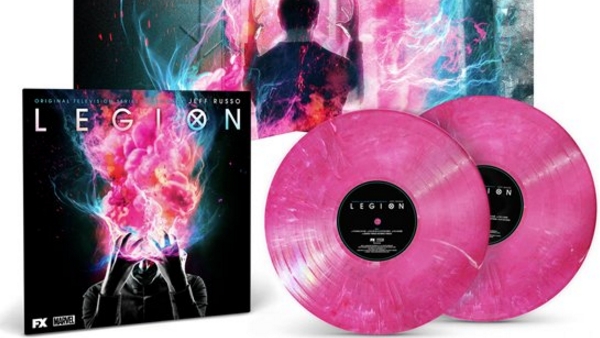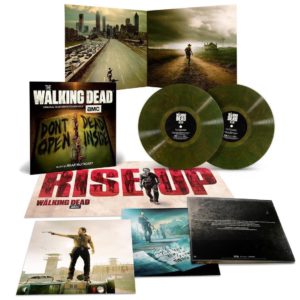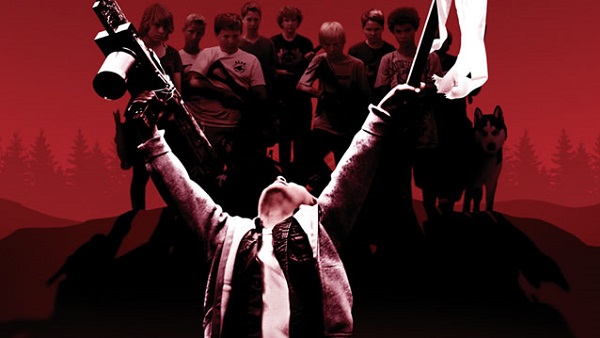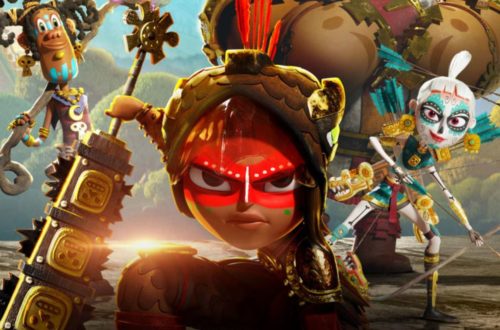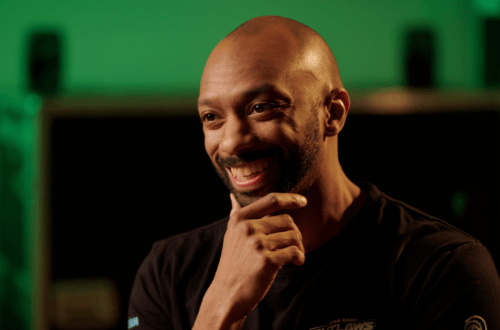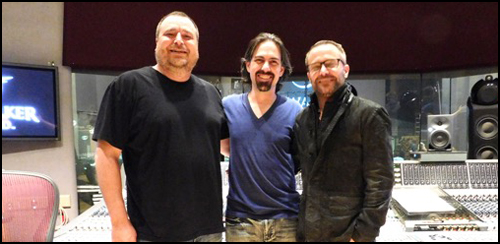 Thanks largely to a trip to Record Store Day in 2014, I have become an increasing fan of soundtrack releases on vinyl…and I’ve never looked back. You may have your own go-to retailers, and while a significant portion of my collection is comprised of Mondo titles, Lakeshore Records (the independent music division of Lakeshore Entertainment) remains a notable force that issues some of the most vibrant, stunning, and downright bad-ass releases you’ve ever seen.
Thanks largely to a trip to Record Store Day in 2014, I have become an increasing fan of soundtrack releases on vinyl…and I’ve never looked back. You may have your own go-to retailers, and while a significant portion of my collection is comprised of Mondo titles, Lakeshore Records (the independent music division of Lakeshore Entertainment) remains a notable force that issues some of the most vibrant, stunning, and downright bad-ass releases you’ve ever seen.
We spoke to the company’s Senior Vice President of Music and Soundtracks, Brian McNelis, about his day-to-day with Lakeshore. As you might expect, after scanning through the hefty number of releases on the Lakeshore Records website, his plate is constantly full. After all, it’s like he says, “It’s hard work, and if it were easy, everyone would be doing it.” Now it takes more than stamina to keep up with the release schedule, work with graphic artists, pressing plants and any technical trade involved in putting an LP in your hand. You also have to have an eye for detail, an understanding of the property, and a good gauge of what will sell. A gorgeous pressing is one thing, but Brian tells us that every effort in the production process – from concept to shipping – is about making the best product. Yet it’s not about making cool art for the sake of it. It has to be in service to the music, and Brian has immense passion for the medium, and the music industry as a whole.
At the end of the day, McNelis’ impetus is “to make dope shit.” He’s got a knack for it – both musically and stylistically – otherwise iconic titles like Drive, Mr. Robot, and San Junipero (the episode from Black Mirror) wouldn’t be in such high demand. He also enjoys working with other labels as the three above-mentioned titles are partnered with Invada in the UK for example. The Grammy-nominated soundtrack album producer believes he’s blessed to be able to do what he does. Over the course of an hour, Brian talked to us about his background, his workload, and his interests. It was incredible listening to him wax poetic about vinyl. Enjoy the highlights of our time with Brian.
GoSeeTalk: Brian, thanks for taking some time to speak with us. I expect that there is no typical day for you, so let’s start by talking about what you’re currently working on.
Brian McNelis: We’ve been doing a lot in TV which is exciting. There’s a lot of action in that space. This is the second coming of the Golden Age of Television! In September we are shipping Legion, Jeff Russo’s incredible score to the Marvel/FX show. There are some nice treats on that record, like “Rainbow Connection” (sung by Dan Stevens), as well as Jeff’s incredible version of “Bolero.” He did a lot of that score on old synths; he used the Synthi 100 which is what Pink Floyd used on the Dark Side of the Moon. That drops on September 22. We have Mr. Robot: Volume 3 vinyl done which is the first volume from season 2 and that show comes back on October 11.
October and Halloween are big for us this year. We’re just starting to work on Stranger Things: Season 2. That’s a big one, and we’re working to get the digital release ready for when the new episodes hit Netflix on October 27. We just completed work on The Walking Dead. The series premiere (now in its eighth season) is Sunday 10/22, and we have a multi-platform release: the CD/Digital release is Friday October 20, and the vinyl is October 27.
Trevor Morris’ amazing score to Castlevania (for the Netflix animated series produced by Federator), drops on vinyl on October 27. The Hellraiser 30th Anniversary retail edition vinyl also drops on October 6 as well. So that’s a lot for one month; October really is our “Nightmare Before Christmas” this year!
As for projects for films, we are releasing two Nick Cave & Warren Ellis albums: one for War Machine and the other is Wind River. They are both truly exceptional albums, and will land in the fall in partnership with Invada in the UK. We also are in the middle of working on Patriot’s Day for Trent Reznor and Atticus Ross (also with Invada UK). These are truly legendary and iconic artists that we have the privilege of working with on each of these titles.
Bushwick is a film scored by Aesop Rock, and it’s so amazing – imagine if DJ Shadow scored The Warriors. It’s one of the most awesome and unique scores of the year. There’s also a repress of Drive that will be on gold vinyl. That one drops on October 13.
Later this year is Wonderstruck, a truly special film and vinyl release you’ll be hearing a lot more about in the next few weeks. The film opens on October 20, and the score by Carter Burwell is amazing! Two thirds of the film is silent as it tells the story of two deaf children. It’s a very special film produced by Amazon Studios. Early next year is Midnight Sun with original songs sung by Bella Thorne. The film is scored by Nate Walcot who also composed music for The Fault In Our Stars.
That’s a ton of titles. So what is a typical release schedule for a vinyl product?
The rule of thumb is that it takes about 12 weeks to turn vinyl, but that’s from the time you have approved artwork and test pressings. So you’re looking at least 3 months out if you’re trying to time something to impact with a specific date on vinyl. We usually have to stagger our releases because vinyl takes so long. Digital and CDs issue first, and the vinyl usually follows.
The Walking Dead is one of the few exceptions where it is all released at the same time. It is an exception, not the rule. The Walking Dead is a long time coming in the making and we’re thrilled to be working so closely with composer Bear McCreary and his label Sparks & Shadows on these releases. We’re also issuing, for the first time on vinyl, the various artist soundtrack album of songs from David Fincher’s masterpiece, Zodiac. That record is coming out on Black Friday via our partners at Phineas Atwood.
Over the years, I’ve talked with the team at Mondo to discuss and provide coverage for a number of their titles. You partnered with them for the Anomalisa vinyl and it looks exquisite. I’d never seen anything like that.
The Anomalisa pop-up vinyl that Mondo i
s releasing in partnership with us has just recently released. That title has been in production since the late 2015. So that’s almost two years! It’s an adventurous and complex project – a fold out, pop-up piece that makes two hotel rooms. When you pull the vinyl sleeve out of the jacket, it creates the wall between the two rooms. We try to work with different partners to create really extraordinary work. The Mondo pop-up is, thus far, one of the most adventurous packages we’ve done. We really have to give it to Mondo, they did all the heavy lifting after we pitched them the idea. They get all the credit, truly.
Sometimes we can get things out quicker than 12 weeks. We turned around Stranger Things in 8 weeks, and that’s from artwork to in-store date which is just amazing. You have to pull a lot of levers to get that to happen, and it has to be a title with enough volume to justify pulling those levers.
That had to be an immediate reaction to how popular Stranger Things became after it was released. It’s the epitome of an overnight sensation. And it just kept growing.
I don’t know that anyone can predict that kind of cultural phenomenon. At Lakeshore, we have been lucky to have been part of a number of those, like Drive, and Napoleon Dynamite. When people are walking around with ‘Vote For Pedro’ t-shirts, you know that something has tapped a nerve with people and transcended the general film and music consciousness.
Drive was that way too, even though it was a bit of a slower build. We knew it was special, but we didn’t know how big it was going to be. Nicolas Winding Refn did an incredible job
with the music selections, and driving the tone and feel of the film. Eric Craig and I had the good fortune of being invited to music supervise the film for Marc Platt. It was Adam Siegel who hired us and we worked for him and Nic on the music. It was a really great experience.
The electronic score by Cliff Martinez is incredible and I think that it a gave voice to a culture that was bubbling up. You know that scene in Close Encounters of the Third Kind where everyone is making Devils Tower out of mashed potatoes and drawing it on walls? It’s like when everyone is having a singular vision, but they didn’t know how to focus on it.
I think that Drive was one of those projects that when it came out, everyone that was interested in and making that kind of music, or part of that scene identified with it. I think that Nic really tapped into something that was in the zeitgeist, but hadn’t really formed yet. Nic had incredible insight to capture that which became a cultural phenomenon in its own right. Same with Stranger Things, but I don’t think anyone can know how to predict that. You can know something is good, and is special and that it resonates, but a cultural phenomenon is hard to predict.
As great as the Martinez score was, I find it amazing that there was this huge draw to something that didn’t have that many songs. At least, not as many as you’d find in albums like Guardians of the Galaxy, Forest Gump, or The Big Chill.
Well I think that the songs were the gateway, but Cliff’s score captured people’s imagination because you were already in the room. The genius thing about Drive was that Cliff’s score compliments those songs perfectly. Remember that when Drive was released in 2011, Spotify really hadn’t come on the scene yet. It was available in the US, but it wasn’t what it is now.
In the Fall of 2011, transactional (download) sales were still the driving digital format, and CDs were still viable. They still are today, they haven’t gone away even though they aren’t doing the numbers that they used to. As an album listening experience, Drive was a really good listen from beginning to end. It still is. It’s not like when the songs stopped and the score started you had walked into another room. The cohesiveness of it was really seamless and intentional.
Let’s talk a little bit about your music supervisor roles and credits.
Our music supervision is primarily for the films produced by Lakeshore Entertainment. We have supervised two films for Marc Platt which were Drive and Song One. We’ve also done three films for CBS Films, and we’re working on a very big video game right now. It’s important to note that a majority of the records we put out are not things we’ve worked on the production at all. Most of our record releases are licensed, and we’re releasing the soundtracks. A big part of my day-to-day job here at Lakeshore is as the music executive and music
supervisor on the films the company is producing. There’s the film production/music supervision side of the business, and there is also the record label. We’re very lucky to have these opportunities to do both.
Sometimes, friends and colleagues and people who like the work we do will call us, and Lakeshore allows us the opportunity to work on films for other productions. We music supervise projects for other productions on a case-by-case basis. For the majority of records we put out, we are working in service of those partners. Some of the films we have supervised at Lakeshore are The Lincoln Lawyer, American Pastoral, The Age of Adeline the Underworld franchise, etc.
It’s always a collaborative process; the direction always comes from the filmmakers, including the director and producers. They have a vision that they bring to us on each show. We do our best to facilitate that vision within the parameters of each production. We’re really in service of those filmmakers. Sometimes they will come to us to fill out the film with music. They usually have a general idea of what they want, if not a very specific one. We work to find exactly what suits their needs for the story, and match the intended tone musically.
I like listening to a record because it makes it an event. You have to plan for it because you have to be in a certain place to spin vinyl. I think that’s lost when music became portable.
That’s what I grew up with. I am of the age and the era where I saved up my money, and I went out and bought an album. I brought it home and unwrapped it. I’d put the record on and obsessively scan the album for every detail that I could get about what it was. Where was it recorded? Who was the producer? Who played on it? What does the artwork mean? What is the message here? And the message is different whether it’s The Beatles, Pink Floyd, Van Halen, Depeche Mode or Nine Inch Nails.
That’s what we did. We’d put it on the turntable, and you had 18 to 20 minutes to just sit there and obsess over this thing. We weren’t on our iPhones, or tuned in to other things. Magazines had limited information, and as a music fan, your portal into this world was the vinyl. It was the thing. It was your doorway in, so I’m glad that people are rediscovering that. It was a beautiful thing. We’re hoping to recapture that excitement in the titles we’re releasing.
What excites you most about your work? Is it the idea phase, is it working with pressing plants or artists, or just getting the rights in the first place?
They’re really all different. But in the largest sense, we just want to make dope shit. [Laughs] That really is the primary driver. What excites me the most is getting something in your hand and being really proud of it, and you go, “that’s f-ing cool!” When it comes to vinyl, the packaging becomes such a big part of it. It’s what we’ve missed from music for years as it went from vinyl to CDs to cassettes and then to digital.
Everyone mourned the loss of the large format medium. As a music fan you could really dive into a vinyl album package while you were listening to the music. But it’s also important to say that the music is the thing. Sure, you can make something that is a crazy engineered vinyl package (and we do), but it’s got to be in service of the music. If the music isn’t exciting, then what’s the point? We’re not just making monuments of art without the consideration of the music. Music first, always.
On that note, what albums have made you the most proud? As a company, you seem to outdo yourselves with each vinyl release.
Thank you. We appreciate that. One of the best parts of contemplating a vinyl release is figuring out how it all fits together. We ask ourselves how, conceptually, does this product tie to the world of the film philosophically, and what can we do with that to make it an exciting experience? On a lot of our titles, we try to stretch the boundaries a little bit. It helps that we have such great partners to work with on these releases.
Look at Bates Motel where we had a dimensional pop-up of the famed Psycho house and hotel. All of our partners worked really hard on that release. IAM8BIT pressed the record, but everyone from NBC and A&E worked closely to make that happen. The vinyl of the blood circling the drain was the icing on the cake!
Another example is Moonlight which had a phenomenal campaign from A24. That primary campaign artwork that makes the face of one person from three different phases in their life. It makes you do a double take, and was truly genius. It’s a very, very strong image. So when when the vinyl design conversations started between our art director and our partners at A24 (and with composer Nicholas Britell), there was a desire to differentiate this piece in the context of the larger campaign.
For the vinyl release, the LP cover is the shot of ‘Little’ on the beach because it is such a powerful image. The vinyl itself is a wonderful translucent blue, like it’s bathed in moonlight. All of the materials are in blue and purple hues, so the translucent blue vinyl captures the spirit of the film. It’s especially fun and exciting to have such amazing partners, as A24 has been to us. And, when a film goes all the way to win the Academy Award for Best Picture, then, for a fleeting moment, we get to touch greatness.
The music to San Junipero (the episode of Black Mirror) is another example. We have been fans of Clint Mansell for a very long time, and when we saw the episode, we knew it was really very special. The score is very intimate, but the episode itself has a lot wrapped up in it. It’s nostalgic, but not in the usual cheesy ‘80s sort of way. It’s more
sophisticated. Then when you get into the episode – this theme of ubiquitous love, across time, and age and everything – we found ourselves asking “how do we pull all that together and represent that?”
We got really lucky that a pop culture artist, Billy the Butcher, had done a series of pulp comic book covers to represent these different episodes of Black Mirror. Our partner on San Junipero is Invada, and they do exquisite work. We’re so thrilled to have them as our UK and European partners on a number of releases. They reached out to Billy the Butcher about the art for the album. They had already been in touch with him for their release of the Men Against Fire episode. The vinyl release really seems to have struck a nerve with people especially with the artwork, and that’s exciting. When you put something out there, you’d like to get that reflection of it back. You’d like to see when people are excited about things you’ve made or contributed to.
I couldn’t believe how much traction that music got. Now you have an idea about what you want, and what you think the market wants, but how much of any release is dictated by people literally voicing their demands, especially on social media?
That’s a really great question. I think that because we’re fans, first and foremost, we’re obsessively entrenched in the culture. Anyone who does what we do (along the entire production chain) are all fans. I believe everyone starts out as fans first. So, as fans, we’re trying to be a part of something we’re genuinely and sincerely excited about because it resonates with us emotionally on some level. Getting to contribute, even in our own very small way, is always an honor. We only get to do what we do, because of all the great work everyone else has done.
Because we’re fans, and not on an island, we’re with all the other fans and we’re talking to them. It’s not like there’s a board room where someone is saying, “Bob, check out Instagram, and see what people think about this!”. [Laughs] That’s not how it happens. It’s really just us asking ourselves in casual conversations “wouldn’t this be f-ing cool?? Yeah, that would be awesome! Let’s see how we can do that!”.
It’s that general fandom and enthusiasm that informs everything. Sure, we might want to pressure test it and see the appetite in the marketplace, and we don’t get it right all the time, but at the end of the day, it’s art. Hopefully we are tuned in at the same frequency as other people and it resonates. But authentically, and legitimately, it comes from being fans. I get up in the morning, I kiss the dirt, and say, “Thank you, I get to get to have another day doing this.”
You’ve given us an idea of what’s current and ahead for Lakeshore Records. So let’s get back to you, personally. What got you into this in the first place?
Music and entertainment is a sort of calling I suppose. I knew I was excited about art and music, and movies. And I seemed to be more excited about it than other people. Growing up, we’d go to the movies, and my friends would go, “that was ok.’ And I was like, “what are you talking about? That was incredible. It changed my life!” I also discovered different types of music that expanded my worldview. College radio in the early ‘80s really changed my life. It was a portal to a lifestyle and experience that
I wasn’t having and I didn’t know anything about. It was Pre-Internet. I was getting my window into a world through music played by college radio stations because mainstream magazines like Rolling Stone weren’t profiling underground weirdo art bands.
From there, I wanted to be a musician and learned how to play keyboards. I was in bands, but at a certain point I realized I didn’t want to load out of a club at 2 AM on a Sunday night in the freezing rain anymore. I love music, and movies, and art, and so I looked for ways I could contribute without necessarily having to be a musician. I have so much respect for musicians because, whether a person is a household name, or someone who’s still struggling, they’ve all put in the hours…they’ve all loaded out at 2 AM. Maybe some of them haven’t done it in a long time, but I guarantee you, every one of them has done it. It’s not a fun place to be. Musicians work really, really hard. You look at Katy Perry, and she works really, really hard.
I’ve been blessed and fortunate in my career to get to know people at every level of the business and there’s no level where it’s not hard. It’s hard at the bottom, and it’s hard at the top. It’s hard everywhere. It may not look so hard because someone’s got millions of dollars, but I’m telling you it’s really hard. So whatever level you’re fortunate enough to experience it on, you’ve really got to want it. Now it doesn’t mean it’s not without its rewards, and it doesn’t mean it’s not fun. Things can be hard and fun at the same time! So, people make a decision to do something that is hard when they could do something that is easier. Whatever you’re doing in this business is probably hard, otherwise everyone would be doing it.
We have to make decisions and sacrifices to do the things that we love doing. I knew I didn’t want a straight job, and that I wanted to work with artists and help advance their careers. I spent a number of years working for record labels and got to be part of campaigns that broke developing artist into superstars. I also worked at independent labels and worked more intimately with artists on a day-to-day basis in service and support of their careers.
Sixteen years ago, I came to work at Lakeshore, and it’s been the best part of my life, second only to my wife and family. At the time. Lakeshore had offices on the Paramount lot, and it had a record label. I got really lucky that timing was great as they were looking for someone with my type of experience. My whole life has been devoted to an appreciation of the arts. I love music and the creation of music being in bands, mixing, and producing, and I’ve done just about everything at one point or another even if not particularly well, or professionally! When I was young I just knew this was something that I wanted to be part of, and had to be part of, so I worked hard to be a part of it.
My old boss used to say that if you’re coasting, that means you’re going down hill. This reaffirms the goal for everyone to have a drive and solid work ethic…and keep at it. Thanks for being so honest about your work and the business.
Like I said, this business is hard, otherwise everyone would be doing it. And clearly not everyone is doing it. If it looks like it’s easy from the outside, it’s because people doing a good job of not letting you see them sweat. There’s a lot of joy in doing this or we wouldn’t be doing it.
The good far outweighs the struggles. We are all blessed, all of us with jobs doing what we get to do. When I look around my office, I’m a kid in a candy shop. Looking at the mementos of 16 years at Lakeshore, I’m humbled by the amazing opportunities I’ve been given and the phenomenal experiences I’ve had. Occasionally there is the opportunity to touch upon greatness. There is also a lot of delight in what we do and that we get to bring that joy to the world, even if it comes packaged as humbly as a 12” flat plastic disc.
Thanks to Brian for his time. Please head to Lakeshore Records to see the amazing line up of albums set for release. If you missed out on a title that has sold out, don’t worry, they’ve got plenty of impressive things lined up and set to drop very, very soon. And if you haven’t started collecting or spinning vinyl. Do yourself a favor…start!
